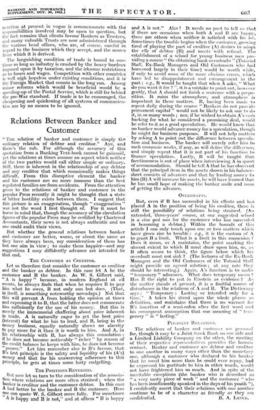THE POSITIONS REVERSED.
But now let us turn to the consideration of the associa- tion where relations are more often strained ; when the bank, er is creditor and the customer debtor. In this case A had better be the banker and B the customer. Here °Ite can quote W. S., Gilbert more fully. For sometimes "A is happy and B is not," and at others " B is happy and A is not." Alas! It needs no poet to tell us that if there are occasions when both A and B are happy, there are others when neither is satisfied with 'his lot. Sometimes the trouble begins when the customer, growing tired of playing the part of creditor (A) desires to adopt the rOle of debtor (B) and meets 'with refusal. The establishment of a school for young business men pro- viding a course " On obtaining bank overdrafts " (Tutorial Staff, Ex-Bank Managers and Old Customers who had borrowed largely in their time) would be worth while, if only to avoid some of the more obvious errors, vihich have led to disappointment and estrangement in the past ; e.g., B "mould be taught that when A asks, " What do you want it for ? ", it is a mistake to point out, however gently, that A should not finish a sentence with a prepo- sition. It ruins the atmosphere, and atmosphere is important in these matters. B, having been made to repeat daily during the course " Bankers do not provide permanent capital would not be likely to ask one to do it, in so many words ; nor, if he wished to obtain A's cash backing for what he considered a promising deal, would he refer to it as a good speculation. He would know that no banker would advance money for a speculation, though he might for business purposes. B will not help matters by asking A to point out the difference between specula- tion and business. The banker will merely refer him to such economic works, if any, as will define the difference, and simply repeat that it is not part of his function to finance speculation. Lastly, B will be taught that facetiousness is out of place when interviewing A in quest of accommodation. Should he tell A that he has observed that the principal item in the assets shown in his balance- sheet consists of advances and that by lending money to him (B) A will increase his assets, he will have learned that he has small hope of making the banker smile and none of getting the advance.












































 Previous page
Previous page